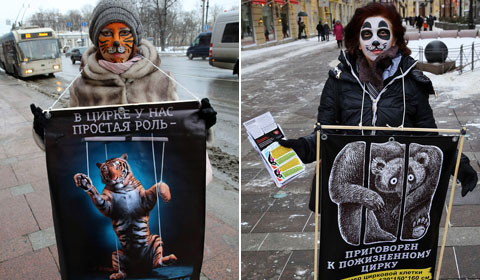Koreas reach out for family reunions
Updated: 2014-02-06 01:23
(AGENCIES / China Daily)
|
||||||||
The rival Koreas agreed on Wednesday to hold a reunion later this month for families separated by the 1950-53 Korean War — the first such event for more than three years. Seoul and Pyongyang said they would hold the meeting from Feb 20 to 25, three days later than agreed before, according to local media reports.
The agreement came after Red Cross officials from both sides held talks at the border village of Panmunjom to sort out details, including the reunion date and venue. The delegates met at Tongilgak, an administrative building on the Democratic People's Republic of Korea's side of the truce village.
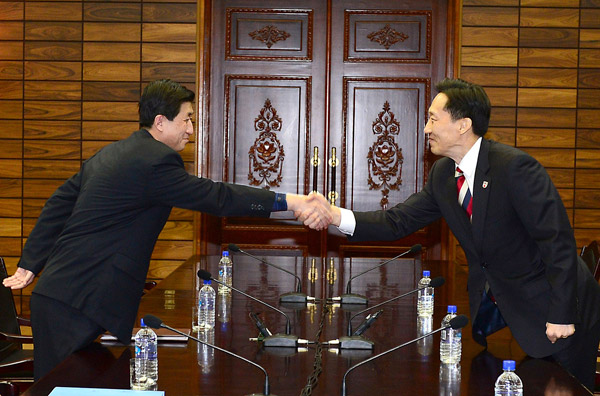 |
|
Head of the DPRK's working-level delegation Park Yong-il (left) shakes hands with his ROK counterpart Lee Duk-haeng during their talks in the truce village of Panmunjom. [Photo/Agencies] |
On Jan 24, the two Koreas agreed on the reunion of war-divided families at the DPRK's scenic Mount Kumgang resort.
The agreement marked a rare moment of cooperation between the two sides, especially coming just weeks before Seoul kicks off joint military exercises with the United States that have been vehemently denounced by Pyongyang.
"We hope that the latest agreement will be smoothly carried out to ease the suffering and pain of separated families," the Republic of Korea's Unification Ministry said.
Any sign of accord between tends to be greeted with optimism.
However, both sides have been here before, and observers warn that setting dates does not necessarily mean the event will take place.
The two Koreas had agreed to hold a reunion last September but, even as the chosen relatives prepared to make their way to Mount Kumgang, Pyongyang cancelled at the last minute, citing "hostility" from Seoul.
And there are widespread concerns that the families could end up being disappointed again, given the unresolved tensions surrounding the ROK-US military drills that are scheduled to begin late February.
The DPRK has warned of dire consequences if the exercises go ahead, while Seoul and Washington have dismissed any possibility of their cancellation.
The annual drills are always a diplomatic flashpoint on the Korean peninsula, and resulted last year in an unusually sharp and extended surge in military tensions.
Yoo Ho-yeol, professor of DPRK Studies at Seoul's Korea University, said that Pyongyang might use the reunion agreement as a bargaining chip.
"Rather than canceling the event again, it may try to extract concessions, like a scaling down of the joint military exercises," Yoo said.
US defense officials have already indicated that — unlike the 2013 drills — this year's version would not involve an aircraft carrier or strategic bombers.

 Chinese Lunar New Year gift from abroad
Chinese Lunar New Year gift from abroad
 Koreas reach out for family reunions
Koreas reach out for family reunions
 Storm to slam two-thirds of US
Storm to slam two-thirds of US
 Clowns gather for Joseph Grimaldi celebration
Clowns gather for Joseph Grimaldi celebration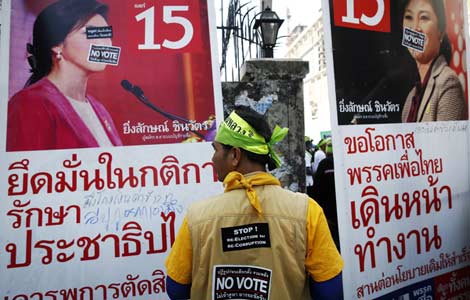
 Thai caretaker PM urges protesters not to block voting
Thai caretaker PM urges protesters not to block voting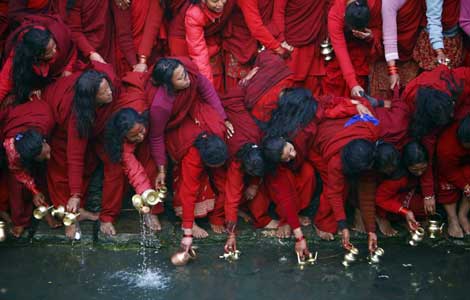
 Holy waters in Nepal
Holy waters in Nepal
 Kongfu stars wax shine in London ChinaTown
Kongfu stars wax shine in London ChinaTown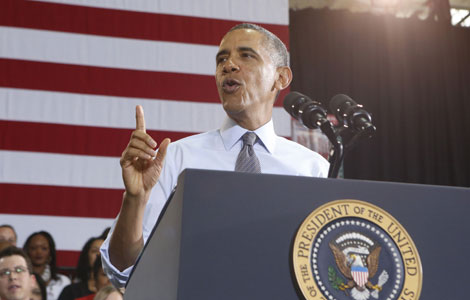
 Obama pushes minimum wage hike
Obama pushes minimum wage hike
Most Viewed
Editor's Picks

|
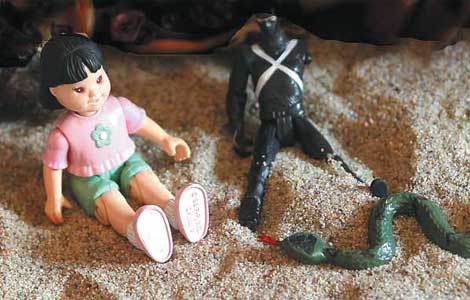
|

|

|

|

|
Today's Top News
Schroeder accuses US of disrespect over sovereignty
US warns airlines about 'toothpaste bombs'
Xi leaves for Sochi ceremony Thursday
US criticism over ADIZ unfounded
Murderer of China students sentenced
China reports 11 H7N9 cases
Data show rebalancing, not weakness: economist
US envoy counsels restraint
US Weekly

|

|


